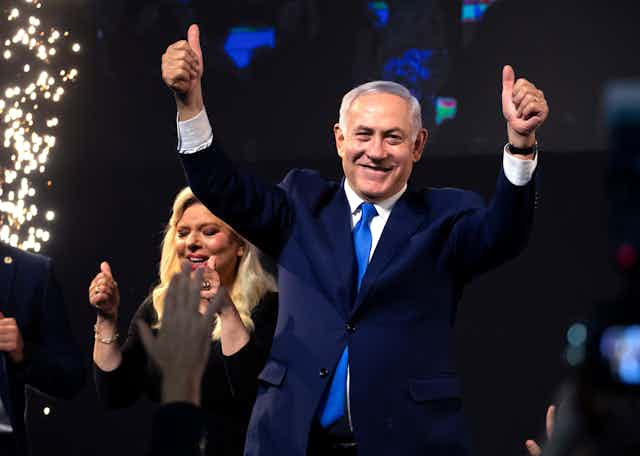If someone had said in 1996 that Benjamin Netanyahu would still be prime minister 23 years in the future, nobody would have believed it. Yet he has managed to obtain what until recently seemed almost impossible in Israel – a fourth consecutive electoral victory. With this, he has become the second longest serving prime minister in the history of the country.
This is not, however, the only reason why this election can be considered one of the most important in Israel’s political history. Indeed, Netanyahu might have finally found his nemesis in Benny Gantz who, with his newborn electoral alliance (Kahol Lavan), won just as many parliamentary seats as Netanyahu’s Likud party. Still, despite expectations about a massive political change, Netanyahu will continue as prime minister in what will perhaps be the most extreme right-wing government ever to run the country. Here are some key components to his success.
1. No leftists left
Netanyahu’s victory was not driven by ideology, but a profound shift to the right is nevertheless visible among the Israeli electorate. It is slowly abandoning the founding ethos of Labor Zionism.
This is particularly clear when you examine the balance between the two main blocs. Apart from the Arab groups, there are only two parties remaining on the left – Meretz and Labor. Meanwhile, on the right, you can count up to five different political groupings in addition to Likud – HaYamina HeHadash, the United Right, Zehut, Yisrael Beytenu and Kulanu.
This imbalance tells us a lot about the left’s current lack of appeal in Israel, mainly due to its inability to engage people with a strong vision. On the contrary, the right provided voters with many political choices representing a strong ideology.
2. Small parties hold the balance of power
Netanyahu will be able to retain the premiership thanks to the presence of a number of small right-wing parties. However, it’s important to note that each of these small parties won the bare minimum number of seats required to even secure parliamentary representation.
Ysrael Beitenu and United Right each have five MPs and Kulanu has only four. That means that the political outcome of this election has been determined by a minority of voters who chose to support extreme right parties.
Netanyahu’s government will therefore have to be particularly attentive to the requests of his allies who, together with the religious parties Shas and United Torah Judaism (both of which have eight MPs), will be eager to remind the prime minister about the importance of their support.
3. Low Arab turnout
The decision of Arab-Israeli citizens to boycott the elections also helped to magnify the dynamics of this election. Only 44% of eligible Arab-Israeli voters turned out to vote. This certainly provided a boost for the right-wing parties, making it easier for them to obtain the 3.25% share of the vote they effectively needed to make it into parliament.

Arab citizens abstained because they felt attacked by Netanyahu and abandoned by Gantz. But their decision could also prove very costly for the Arab community in Israel. Netanyahu’s new government is expected to introduce restrictions on their status as citizens.
4. A highly personal campaign
Key to Netanyahu’s electoral victory was his ability to set the ground rules of the campaign. He established a narrative that placed him as the irreplaceable “king”, under constant attack by enemies in politics, the media and even the judiciary. None of Netanyahu’s adversaries were able to disentangle themselves from this narrative.
The election was seen as a referendum on Netanyahu, especially because of his recent indictment for bribery, fraud and breach of trust. Ultimately that meant there was very little debate about anything else on the campaign trail. There was no discussion about the economy, welfare or, even more importantly, the Palestinian question. Netanyahu’s strategy, described by The Economist as a “parable of modern populism”, seems to have worked once again.
This election could be considered one of the most critical in the history of the country. The political discourse adopted by Netanyahu and his allies demonstrated the will of the nationalist right-wing bloc to change the rules that define Israel as a democratic state. The party system seems to have entered a new phase and electoral behaviours seem to be changing.
Despite Netanyahu’s victory, the political future of Israel is not yet written. He may still face prosecution, and with such a narrow gap between his government and the opposition, there may still be significant political change for Israel in the near future.

